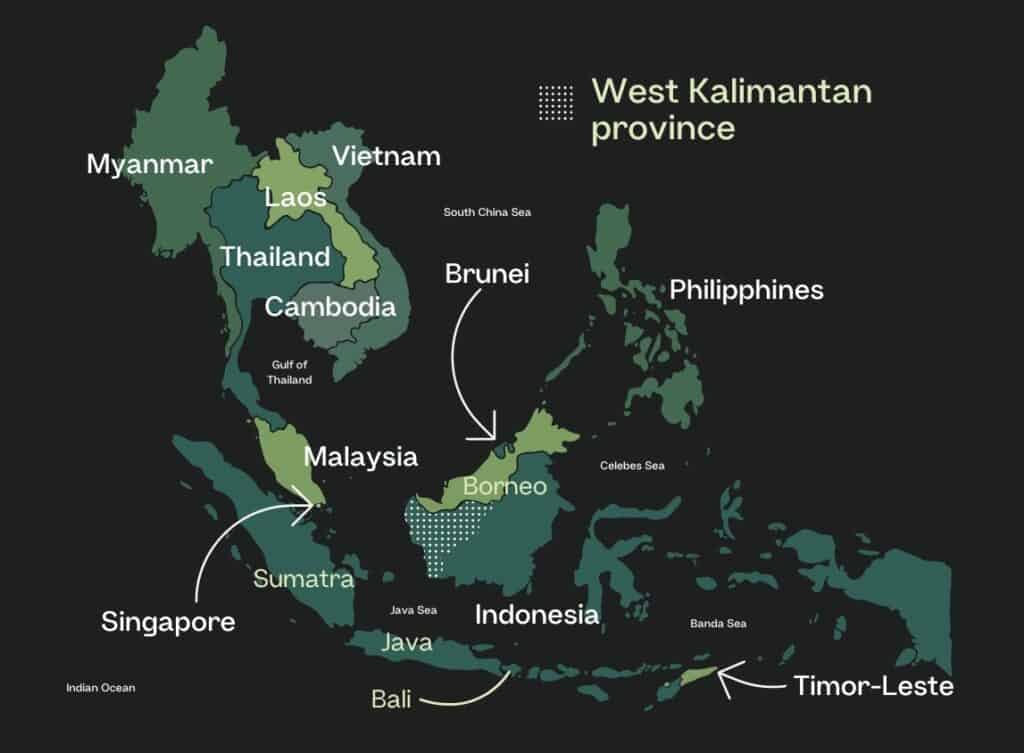In a major shift that’s now rippling through global kratom markets, Indonesia has enacted a ban on the export of crushed kratom leaf.
While the new Indonesian export ban has hindered the normal supply of kratom for all types of American importers, it’s proving especially disruptive for businesses that rely on crushed leaf—and as the only U.S. kratom company focused on crafting kratom tea bags, Top Tree is feeling the crunch in a different way.
The new rules were enacted under Trade Minister Regulation No. 20 of 2024 as an amendment to an existing law that controlled the export of various other products. They prohibit the export of kratom in its raw or semi-processed form, including whole leaf and crushed leaf.
Underlying Motivations for the Crushed Leaf Kratom Export Ban
What was the goal of restricting certain forms of kratom from being legally exported? To keep more of the economic value from kratom processing within Indonesia.
Of the many U.S. companies that have imported crushed leaf in the past decade, most have not been using it the way we have used crushed leaf at Top Tree; most American manufacturers transform the crushed kratom leaf into extract products, which have a very high concentration of kratom alkaloids and a similarly high profit margin.
Indonesian farmers haven’t seen the same financial upside from their position in the kratom supply chain. The cost of raw leaf kratom has been fairly low in the past few years. Plus, large kratom importers have rejected kratom shipments (and not fully paid for them) if they found that the leaf material was contaminated upon arrival.
So by restricting raw and semi-processed exports, the Indonesian government hopes to encourage more processing to happen locally. This hopefully would create jobs and keep more profits from kratom production in Indonesia.
To be legally exported, all kratom must now be processed to a fine powder under 600 microns (0.6 millimeters) or transformed into finished goods before it can legally leave the country. Crushed leaf particle sizes typically range from 1–5mm, making crushed leaf a prohibited export.
So instead of importing crushed leaf to mill and extract in the United States, brands will be forced to buy powder or extracts directly from Indonesia.
Yet where does that leave businesses that purchased crushed leaf without any intention of milling or extracting it?
Unintended Casualties of the New Indonesian Law
The Top Tree team fully supports Indonesia’s initiative to regulate kratom. The new policies are part of a broader strategy to raise industry standards and improve Indonesian laborers’ quality of life. There’s certainly good in that. Nevertheless, the legal decision has had some unintended consequences.
This change was designed to prevent big companies from exporting raw leaf cheaply and raking in profits from extracts. However, it also swept up smaller players, including Top Tree, which uses crushed leaf kratom to make tea which emulates traditional Southeast Asian brewing methods as closely as possible.
Unlike extract manufacturers, Top Tree is not using crushed kratom leaf to chase sky-high potency and profits. We’re here for the ritual, the brew, the community…
Companies like ours—which focus on lower-potency products that allow for more intentional, sustainable kratom consumption—aren’t the norm, but we believe one day they could be, as long as the market and regulations leave space for us to thrive.
Why Prices of Crushed-Leaf Kratom Are Skyrocketing
Right now, our team is distressingly unable to source the type of leaf needed to make a cup of kratom tea.
Since the Indonesian export restrictions were enacted, the cost of crushed leaf kratom has skyrocketed. Depending upon the supplier, prices are 100–400% higher than they were in late 2024.
Over the past few months, the stateside supply of crushed leaf from Indonesia has dwindled. (In fact, shipments of all kinds of kratom from Indonesia—not just kratom with a larger particle size, but powder, too—have been delayed since the beginning of the year.)

Indonesian Regulations Are Pushing Kratom Companies to Find Suppliers in Other Countries
In the absence of the regular supply that American kratom companies and our customers have come to rely on, businesses have begun searching for kratom in alternate locations. Indonesia has historically been the largest exporter of kratom, responsible for over 90% of the kratom in the United States, but kratom trees are able to grow in other nearby countries as well.
Unfortunately, the nascent kratom farming operations in countries like Thailand haven’t yet reached the scale of Indonesia’s kratom industry. This means the cost of Thai kratom is much higher and the quality remains uncertain.
What You Can Expect from Top Tree in the Coming Months
The Indonesian kratom export ban is one of the biggest challenges our team has faced in our company’s history (aside from the broad attempts to ban kratom outright, which threatened the entire kratom community). But we’re not throwing in the [tea] towel any time soon.
We know many of you count on us. We’ll keep working as hard as we can to get you the tea you love and rely on. We are actively exploring every option to find new suppliers who meet our high standards without compromising on quality or drastically driving up prices.
Staying Afloat Amid Unprecedented Changes in Tea Accessibility
Because of the disruption to the availability of kratom leaf, Top Tree may run out of stock of some of our teas in a few months. Regrettably, we’re hitting pause on discounts and big promos until we can stabilize our supply.
We’ll keep you posted with updates as the Indonesian and Thai kratom export landscapes evolve. If you have questions, we’re always happy to chat. Thanks for being patient with us as we navigate this rocky territory.

